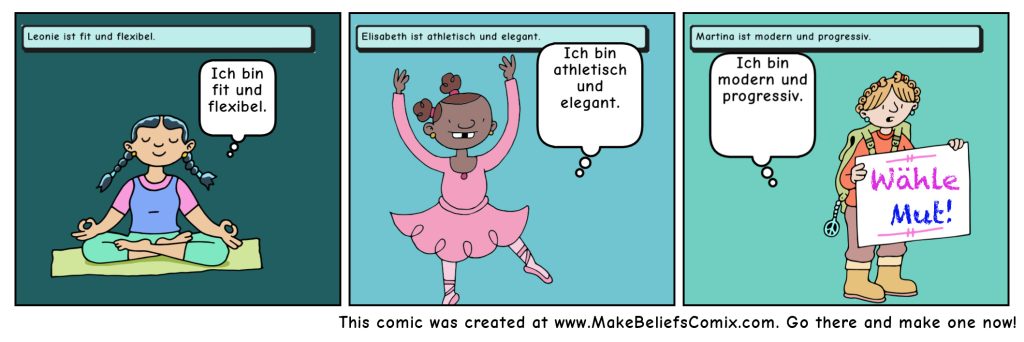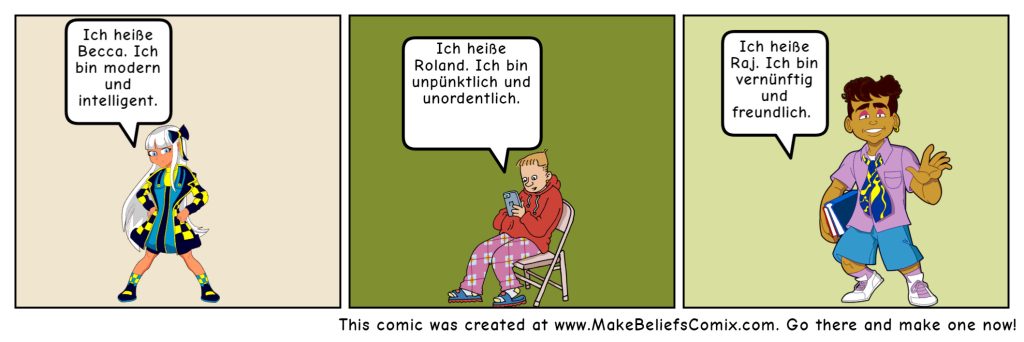3.1 Eigenschaften

Hallo alle zusammen!
Zum Aufwärmen machen wir unseren Tagesminiplausch und eine Wiederholung.
Wiederholung
In the previous lessons, you learned how to describe your nuclear family and your family’s origins (deine Herkunft). Let’s review by reading about each famous person in the chart below. Then complete the questions about each person.
 |
¡Hola! Ich heiße Shakira. Ich komme aus Kolumbien und bin 47 Jahre alt. Ich bin Kolumbianerin. Ich singe auf Spanisch und Englisch und spreche auch Portugiesisch, Französisch, Italienisch und Arabisch. |  |
Hi, ich heiße Connor McDavid. Ich komme aus Kanada; ich bin Kanadier. Ich bin 27 Jahre alt und ein sehr guter Hockeyspieler. Ich wohne in Edmonton. Ich spreche Englisch und ich spreche nur ein bisschen Französisch. Meine Lieblingsfarben sind orange und blau. |
 |
Grüezi! Ich heiße Roger Federer und ich bin 42 Jahre alt. Ich spiele Tennis. Ich komme aus der Schweiz, ich bin also Schweizer. Aber ich habe auch einen Pass aus Südafrika. Ich spreche Deutsch, Englisch und Französisch. |  |
Hallo, ich heiße Fatih Akin. Ich bin 50 Jahre alt Ich bin Filmregisseur. Ich komme aus Hamburg (Deutschland), aber meine Mutter und mein Vater kommen aus der Türkei. Ich bin Deutscher und ich spreche Deutsch und Türkisch. |
Jetzt bist du dran!
Using the descriptions above as a general template, introduce yourself, say where you are from, how old you are, where you live, and what languages you speak. Like Connor McDavid, you can also share deine Lieblingsfarbe!
Lektionsüberblick
Being able to describe yourself means being able to name some of your characteristics (Eigenschaften), words that describe how a person is. In this lesson, you will be introduced to a longer list of characteristics with the expectation that you memorize some of the words that are most immediately relevant to you in order to build your active vocabulary and that you review the remaining words as a group without necessarily memorizing them all in order to build your passive vocabulary. In the end, you will be able to 1) identify characteristics that are cognates, 2) identify opposites formed with an “un-” prefix, and 3) name at least two characteristics that describe yourself.
1) Identify characteristics that are cognates
Many German adjectives that you might use to describe yourself are similar to English. When words between languages are similar, they are called cognates. The chart lists several of these that you should easily be able to recognize without a dictionary. Take a look. How many German words do you recognize? Listen to the audio for each column to hear the difference from the English pronunciation.
Eigenschaften (Characteristics)
| athletisch | flexibel | kreativ | objektiv | sarkastisch |
| clever | intelligent | kritisch | optimistisch | sentimental |
| elegant | interessant | modern | pessimistisch | sportlich |
| exzentrisch | kompetent | naiv | positiv | sympathisch* |
| fantastisch | konservativ | nervös | progressiv | talentiert |
| fit |
*sympatisch is a bit of a false friend. It means congenial, friendly, simpatico – not sympathetic. (Sympathetic = mitfühlend.)
Practice by answering the questions in the question sets below (be sure to click through to each question).

Jetzt bist du dran!
Köln im Blickpunkt

Köln ist die viertgrößte Stadt Deutschlands nach Einwohnerzahl und ist für den Kölner Dom bekannt. Er wurde im gotischen Stil gebaut und hat zwei hohe Türme. Der Bau begann im 13. Jahrhundert und dauerte viele hundert Jahre. Heute zählt der Dom zum UNESCO-Weltkulturerbe und ist das Wahrzeichen der Stadt. Der Dom ist so groß und aufwendig, dass ein Neubau heute etwa zehn Milliarden Euro kosten würde.
Cologne is the fourth-largest city in Germany by population and is known for its Cathedral. It was built in the Gothic style and has two tall towers. Construction began in the 13th century and lasted for many hundreds of years. Today, the cathedral is a UNESCO World Heritage Site and a symbol of the city. The Cologne Cathedral is so large and elaborate that a new one would cost about ten billion euros today.
2) Identify opposites formed with an “un-” prefix
A nice feature of many German adjectives is that you can add the prefix -un to make the adjective become the opposite attribute.
Jetzt bist du dran!
3) Name at least two characteristics that describe yourself
Bist du freundlich? Bist du intelligent? Let’s learn how to answer. Be sure to click through each question in the question set below.

If you would like to explore some additional adjectives, you can visit:
- The DeutschLernerBlog: Die wichtigen deutschen Adjektiven
- SprachKuKo: Charaktereigenschaften
Jetzt bist du dran!
Zum Schluß

*As you conclude this lesson, don’t forget to check Canvas!*

Media Attributions
- Famous Person Profiles adapted from Willkommen: Deutsch für alle, Copyright © 2020 by Claudia Kost and Crystal Sawatzky, licensed under a CC BY-NC-SA 4.0 International License.
- List of Eigenschaften adapted from German 101 Copyright © 2022 by Rebecca Linam, licensed under a CC BY 4.0 International License, except where otherwise noted.[/footnote]
Media Attributions
- 1010-1020 banner long large reduced
- Photo of Shakira from Willkommen deutsch für alle by 2023-11-16_Gala_de_los_Latin_Grammy,_03_(cropped)02 © Junta de Andalucía is licensed under a CC BY-SA (Attribution ShareAlike) license
- Connor_McDavid_2-FEB-2022-225×289
- Roger_Federer_18566686046-225×189
- Photo of Faith Akin from Willkommen Deutsch für alle, Fatih_Akin_cropped_2009-225×276
- 3.1 Eigenschaften _1 comic © This comic strip was generated at http://www.MakeBeliefsComix.com. Used by permission of author and site creator Bill Zimmerman.
- koelner dom © Rebecca Steele is licensed under a CC0 (Creative Commons Zero) license
- 3.1 Eigenschaften _3 comic © This comic strip was generated at http://www.MakeBeliefsComix.com. Used by permission of author and site creator Bill Zimmerman.
- Private: confidence scale_large horizontal_updated

